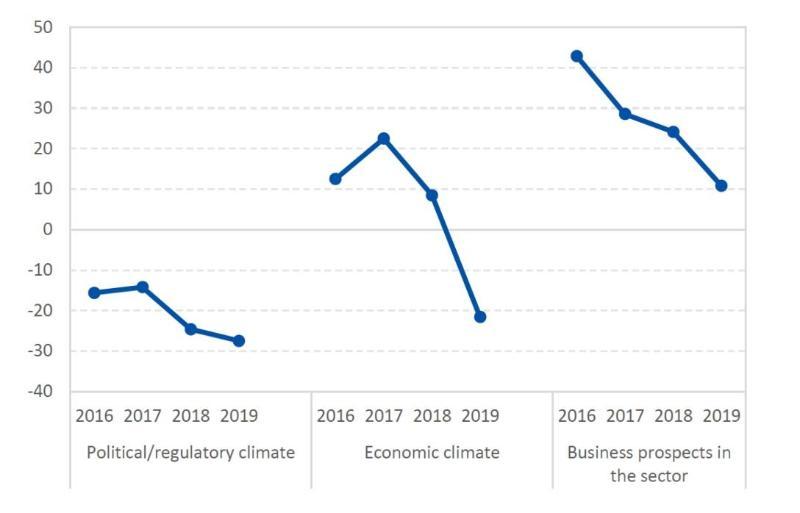- Economic climate in the EU is worsening and investment by EU firms is likely to slow down in 2020
- EU climate mitigation investment stagnating and behind US and China
- Europe needs to accelerate adoption of digital technologies to stay competitive
European firms are becoming increasingly pessimistic about the economic outlook according to the new EIB Investment Report 2019/2020. The report also finds that investment in climate change mitigation is lower than that of major economies like the US and China. Infrastructure investment is stuck at 1.6% of EU GDP, the lowest in 15 years and Europe is failing to reap the benefits of digital transformation. The report, which reflects the results of the annual EIB Investment Survey (EIBIS) of 12,500 European businesses, recommends that the EU take advantage of historically low interest rates, increase public investment, catalyse private investment and promote efficient financial intermediation to tackle the slowdown.
Commenting on the report’s findings, EIB Vice-President Andrew McDowell said: “Europe cannot afford to wait out another cyclical downturn. After a lost decade of weak investment, we need to tackle the slowdown now if we are to respond to the historic challenges we are facing. The EIB, as the EU’s financial arm and climate bank, has played a crucial role in kick-starting investment in Europe after the financial crisis and we now stand ready to further support investment for a more sustainable and competitive European economy.”
“We have to accelerate investment to fully exploit the benefits of the digital revolution, realise our climate goals and rebuild Europe’s social cohesion,” said Debora Revoltella, Director of the EIB’s Economic Department, presenting the report. “There is a long list of investments that require public intervention or a private sector that finds the right conditions to overcome uncertainty: firms’ digitalisation, innovation and business dynamism as well as smart delivery of infrastructure and public services, green innovation and energy efficiency, and e-government, e-learning and e-training.”
Read the executive summary
Read the country-level analyses
The report was presented at the EIB’s Annual Economic Conference, which is jointly organised with the OECD, Columbia University and SUERF, in Luxembourg. The conference brought together high-level speakers such Sir Nicholas Stern and Mariana Mazzucato and chief economists of the European Central Bank, European Stability Mechanism, OECD, European Bank for Reconstruction and Development and the World Trade Organisation.
Investment activity likely to slow down in 2020
Investment activity in the European Union has now recovered from the last recession, with investment up to nearly 21.5% of the European Union’s GDP. This is 0.5 percentage points above the long-term average. However, EIB Investment Survey 2019 data show that EU firms have become more pessimistic about the political and regulatory environment and now expect the macroeconomic climate to worsen. The number of EU firms planning to reduce investment has risen for the first time in four years. EU firms are also more pessimistic than their US peers, suggesting a rather fragile investment environment going forward.
Investment drivers, firms expecting an improvement/worsening

(% net balance, % of firms expecting improvement minus % expecting deterioration)
Source: EIB Investment Survey 2019
EU climate investment not on track
The EIB Investment Report shows that, although substantial progress has been made, climate action investment in the EU is not yet on track. To achieve a net zero-carbon economy by 2050, the EU must raise total investment in its energy system and related infrastructure from 2% to 3% of GDP on average.
The European Union invested EUR 158 billion in climate change mitigation in 2018. At 1.2% of GDP, this is now marginally less than the United States (1.3%) and little over a third of China’s performance (3.3% of GDP).
While the United States leads in climate-related R&D spending, China has recently quadrupled its spending, overtaking the EU. Europe’s weak performance in climate-related R&D is a threat to its competitiveness, given the importance that still-immature technologies will have in the transition.
Slow adoption of digital technologies
The adoption of digital technologies in Europe is slow, with a growing digital divide among firms. Digital firms tend to invest more, innovate more and grow faster, enjoying first-mover advantage. However, only 58% of firms in Europe are digital compared to 69% in the US, with a particularly strong gap in the service sector (40% vs 61%). 30% of older (more than 10 years old) smaller and medium-sized companies in Europe are persistently non-digital.
Background information
The annual EIB Investment Report
The EIB annual report on Investment and Investment Finance is a product of the EIB Economics Department, providing a comprehensive overview of the developments and drivers of investment and its finance in the European Union. It combines an analysis and understanding of key market trends – in investment, infrastructure, innovation and climate change mitigation – with a more in-depth thematic focus, which this year is devoted to business dynamism and transformation, including an analysis of the start-up and scale-up process, business productivity and polarisation, as well as skills gaps. The report draws extensively on the results of the annual EIB Investment Survey (EIBIS).It complements internal EIB analysis with contributions from leading experts in the field. EIB Investment Report 2019/2020
The EIB Economics Department
The EIB Economics Department provides economic analyses and studies to support the Bank in its operations and in the definition of its positioning, strategy and policy. The Department, a team of 40 economists, is headed by Debora Revoltella, Director of Economics.